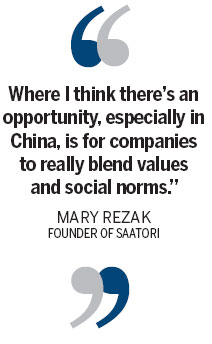Outward and onward
Updated: 2013-06-28 08:08
By Todd Balazovic (China Daily)
|
|||||||||||
|
Mary Rezek believes sending Chinese to work in international operations improves a company's chances of succeeding in the East. Wang Jing / China Daily |
Foreign bosses in china could benefit more by sending local talent out into the world
In the rush to take part in China's boom, many companies have overlooked the potential benefits of exporting Chinese talent to their global operations, says a high-level training consultant.
Mary Rezek, the American founder of Saatori, a leadership advancement consultancy based in Shanghai, believes companies that send their Chinese employees to work in international operations have a greater chance of succeeding in the East.
"What I am noticing is that as the world has rushed into China, there are now a lot of entrepreneurs and a lot of opportunists, but there's not a lot of exporting of Chinese talent," she says.
Utilizing Chinese expertise beyond the country's borders not only gives a company access to a different cultural approach to problem solving, it also helps better prepare an organization for doing business in China.
Rezek has observed the benefits of engaging Chinese staff in international operations through 15 years of working as a leadership development and corporate learning consultant for some of the first multinational companies to enter the market on the Chinese mainland.
Now she is working with leaders from top companies helping them develop inspirational new ways of leadership and problem solving - what she describes as inspiring "a-ha" moments.
"I don't know if you've ever had one of those moments where you have had a problem or challenge, and somehow or another the solution hits you and you think 'Ah, that's what it is'," she says.
"There's almost a liberating moment as the clouds part and you're free. I believe in that, and I work with people to help find those moments. It's tough work, but I help find clarity."
Having built up extensive experience in corporate management training, Rezek founded Saatori in 2006, naming the company after the Japanese word for "awakening".
Since then, Saatori has worked with top to mid-level management at some of the largest foreign enterprises in China, racking up a diverse client list that includes Dow Chemical, Yahoo, McDonald's and Adidas.
Most of her business, she says, comes through positive referrals and word of mouth.
For Rezek, Saatori is a chance to leverage her extensive China experience to continue developing cross-cultural leaders. For international and Chinese clientele it's a way to get a step up on the corporate ladder.
"Where I think there's an opportunity, especially in China, is for companies to really blend values and social norms," she says.
"What I want to do is to look at how leaders operate here and help them acclimate to be as successful as a leader in, let's say, Germany or in America, or in the UK."
Rezek is no stranger to the challenges of adapting, understanding and thriving in unfamiliar business environments.
Arriving in Shanghai in 1997, it was the first time Rezek had traveled to China and she spoke no Mandarin. She discovered that female professionals were a rarity, sometimes to the point of spectacle, in China's fledgling business scene.

"I remember going to conferences and networking events where I was the only female in the room," she says.
She began engaging with multinational companies, resolutely looking for a part to play in the nation's business development.
"I didn't care, I just went after it."
Her efforts quickly paid off. Three months after her arrival, she landed a job at Coopers and Lybrand accountants as the company's national training manager. While there, Rezek created and implemented training infrastructure, working with more than 1,400 local and international staff.
The merger between Coopers Lybrand and Pricewaterhouse in 1998 saw her role grow considerably as she was charged with integrating the two companies' employee development programs.
"I worked with the partners, because they had the knowledge and know-how, to help them impart that to the Chinese staff. I was helping blend the partnerships and helping create a company culture."
She attributes cutting-edge training practices and a willingness to engage in fresh techniques to the company's early success in the China market.
"In the early days it was a new landscape and required new learning. During that time it was my job to train the trainers," she says.
"I did things from creating a training curriculum to coaching leaders to actually facilitating change in management. We were porting cutting-edge learning and development initiatives over to China when it was still very, very young."
In 1999, Rezek moved to Microsoft where she worked as an organizational development consultant for the Greater Asia region.
With the development of China's economy came a maturing talent pool from which international companies could hire experienced local staff who required much less training.
Adapting to China's changing workforce, Rezek's specialty has evolved from teaching the basics to creating leaders who can cross cultural barriers to operate effectively at home and abroad.
Whether working with Americans stepping into a managerial role in China or Chinese executives expanding their reach overseas, strong leaders all share a similar skill set, she says.
"For a leader to be successful, there's a need for that ability to ask provoking questions that challenge, to manage upwards and to be self aware," Rezek says.
"Without those qualities, leaders will not have the impact, the influence and the voice they need - the voice they need to propel their business to success."
toddbalazovic@chinadaily.com.cn
(China Daily European Weekly 06/28/2013 page23)
Today's Top News
List of approved GM food clarified
ID checks for express deliveries in Guangdong
Govt to expand elderly care
University asks freshmen to sign suicide disclaimer
Tibet gears up for new climbing season
Media asked to promote Sino-Indian ties
Shots fired at Washington Navy Yard
Minimum growth rate set at 7%
Hot Topics
Lunar probe , China growth forecasts, Emission rules get tougher, China seen through 'colored lens', International board,
Editor's Picks

|

|

|

|

|

|






